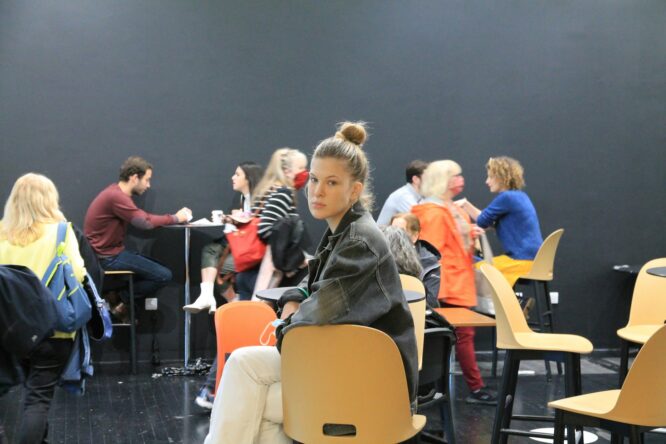Insecurity doesn’t always give itself away verbally; more often than not, it shows in the little things we do.

From body language to how we interact in a room, there are subtle signs that can make someone come across as unsure of themselves, even if they’re trying their best to seem confident. However, most people aren’t even aware they’re doing it.
That doesn’t mean you need to overthink every movement or mannerism, but noticing the behaviours that unintentionally give off insecure energy can help you tweak how you carry yourself. Because often, confidence isn’t about being loud or flashy—it’s about being grounded, relaxed, and comfortable in your own skin. If you want to give off an air of self-assurance, avoid doing these things.
1. Constantly checking your phone in social settings

Pulling out your phone when you’re feeling awkward or unsure is a common reflex. It gives you something to do, a way to avoid eye contact, and a feeling of control. However, to other people, it often reads as disengagement or discomfort.
It sends the message that you’d rather be elsewhere or that you’re looking for an escape. Confident people tend to be more present, even during pauses or quiet moments. Putting the phone away, even if you feel unsure, can change the energy in a subtle but powerful way.
2. Avoiding eye contact altogether

While too much eye contact can feel intense, avoiding it entirely can come across as anxious or uncertain. It may make people feel like you’re uncomfortable, hiding something, or lacking self-assurance, even if that’s not your intention at all.
Confident eye contact doesn’t mean staring someone down. It just means being able to look at someone naturally, especially when you’re speaking or listening. Practising this can go a long way in changing how people see your presence.
3. Over-apologising for things that don’t require an apology

People who feel unsure of themselves often apologise out of habit, even when they haven’t done anything wrong. Saying “sorry” too often can dilute your voice and make you appear as if you’re constantly second-guessing yourself.
While kindness and accountability matter, not everything needs an apology. Sometimes a simple “thanks for waiting” sounds more self-assured than “sorry I took so long.” It’s a small adjustment, but one that changes how people see you.
4. Slouching or shrinking your posture

Your posture says more than you might realise. Slouched shoulders, crossed arms, or constantly looking down can all signal that you’re trying to take up less space or avoid being seen, both of which suggest insecurity.
Standing tall with relaxed shoulders and an open stance doesn’t just make you appear more confident; it also impacts how you feel internally. People often respond to posture before words, so how you hold yourself matters more than you think.
5. Laughing nervously or too often

A nervous laugh after every sentence, or when nothing particularly funny has happened, can make you appear unsure or self-conscious. It’s often a filler to ease tension or seek approval, but it can backfire if it feels out of place.
There’s nothing wrong with laughing, of course, but when it becomes a default reaction to discomfort, it can dilute your presence. Slowing down and sitting with silence or sincerity instead can project calm and self-trust.
6. Fidgeting constantly

Tapping your foot, playing with your sleeves, or shifting in your seat might seem harmless, but it often sends the message that you’re uncomfortable in your skin. Even subtle movements can make people sense unease or tension.
Confidence usually shows up as stillness or intention. You don’t have to be rigid, but being aware of repetitive movements can help you appear more in control. A relaxed stillness speaks volumes without saying a word.
7. Over-explaining your decisions or opinions

If you find yourself justifying everything you say, even simple choices like what you ordered for lunch, it can come across as needing validation or fearing judgment. It sends the message that you don’t trust your own voice.
People who speak with confidence don’t over-defend their preferences. They state things clearly and move on. You don’t need to convince other people that your choices are okay—you just need to feel okay with them yourself.
8. Not knowing what to do with your hands

When you’re standing around or speaking to a group, awkward hand movements—or freezing them stiff at your sides—can make you look unsure. People often underestimate how much our hands contribute to how confident we seem.
The trick isn’t to overthink it, but to let your hands move naturally as you speak or rest them comfortably if you’re not. When your gestures match your words, it gives your body language a sense of ease and control that people pick up on immediately.
9. Avoiding speaking up in group settings

Even when you have something valuable to say, staying quiet can send the message that you don’t trust your voice or fear being judged. After a while, people may begin to overlook your presence or assume you don’t have much to contribute.
You don’t need to dominate the room to be heard—just speak when you have something to add, even if it’s brief. Your presence becomes more confident the more you allow yourself to be part of the conversation.
10. Smiling in a way that looks more like people-pleasing than joy

There’s a difference between a genuine smile and one that’s trying too hard to keep everyone comfortable. If you catch yourself smiling even when you’re uncomfortable or not amused, it may be a sign you’re subconsciously trying to avoid disapproval.
Authenticity always comes across better than trying to manage everyone’s emotions. You’re allowed to have neutral expressions. People tend to respect someone who can hold their own emotional tone, rather than constantly mirroring other people.
11. Speaking too quietly or trailing off

A voice that’s hard to hear, hesitant, or disappears at the end of a sentence can unintentionally make you seem unsure of yourself, even if your words are solid. People may tune out simply because the delivery doesn’t match the message.
You don’t need to be loud, but you do need to speak with intention. Clear speech, steady pace, and finishing your sentences with purpose can dramatically shift how confident you seem, even if you’re nervous on the inside.
12. Hovering on the edge of groups instead of joining in

If you physically distance yourself in social situations—standing back, staying off to the side, or waiting for an invitation—it can signal self-doubt, even if you’re just trying to be polite or observe.
Confidence isn’t about being the centre of attention—it’s about stepping into the room like you belong there. Joining a group conversation or taking a seat without overthinking it sends a subtle but clear message: you’re comfortable being part of the space.
13. Mimicking people instead of showing your own style

Whether it’s your tone, laugh, or even how you dress, copying other people to blend in might feel safe, but it can make you look unsure of who you are. While we all adapt a little in different settings, losing your individuality can come across as insecurity.
People are drawn to those who have a sense of self, even if it’s quiet or understated. You don’t need to stand out loudly—just trust that your natural way of showing up is enough without having to mirror those around you.
14. Constantly looking for reassurance through body language

Glancing around for approval, watching people’s faces for reactions, or checking if someone’s laughing at your joke can all send a message that you’re unsure about how you’re being perceived. The need for constant feedback often goes unnoticed by the person doing it, but other people can sense it.
Confidence grows when you stop looking for signs that you’re “getting it right” and start trusting your place in the conversation. It doesn’t mean never caring what people think—it just means you stop needing proof in every moment.




